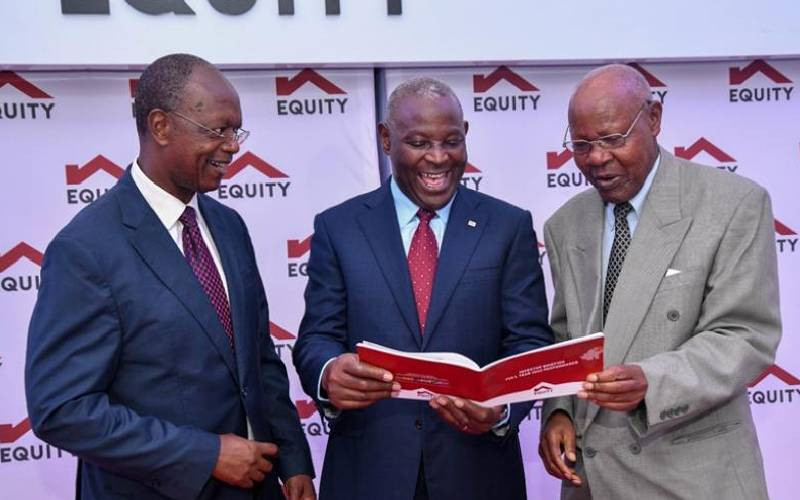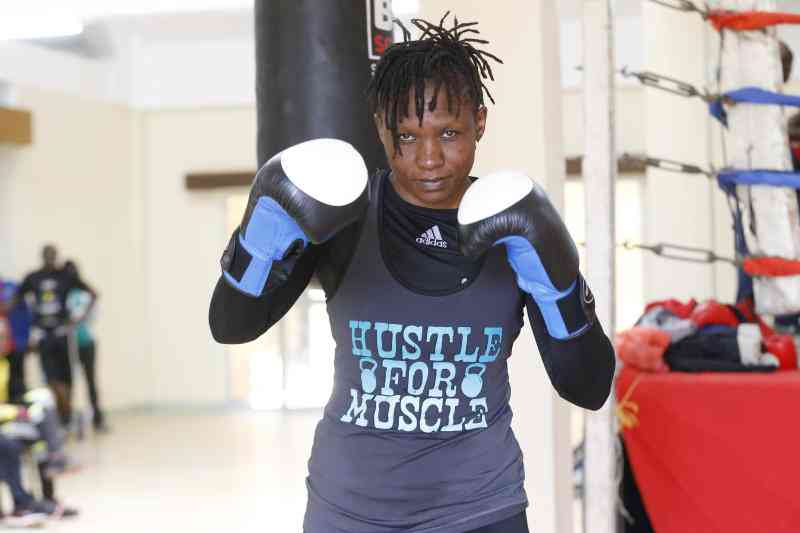 |
|
Equity Bank CEO James Ndung'u (left) and Safaricom's Bob Collymorre. |
Equity Bank is in plans to change the face of mobile money transfer in the country. It is set to fork out billions of shillings to subsidise money transfers in the first year of operations of its new platform, Equitel.
The bank will reportedly spend Sh10 billion to shake up the sector, which seems like a wild dive into the unknown given the experiences of those who have tried to challenge market leader M-Pesa.
However, a top researcher at New York University predicts Equity will succeed and offer the stiffest challenge yet to Safaricom’s platform, evening out in terms of transactions in the next three to five years.
Sharing economy
Arun Sundararajan, a professor of digital economics at NYU’s Stern School of Business, said the nature of Equity Bank’s Thin SIM, which allows it to blend various offerings on a single platform, meshes well with the sharing economy model. This model is a socio-economic system built around the sharing of human and physical resources.
A source closely involved in Equity’s massive investment plans disclosed the Sh10 billion budget would cover the costs of advertising and freebies that will be offered to customers.
The bank will launch a campaign to leverage on its strong financial position to gain a foothold in a market dominated up to 80 per cent by Safaricom’s M-Pesa.
Equity will offer token cash gifts to its customers to be used to purchase airtime, data and utilise low-cost options for money transfer.
Already, the bank is said to be “pleased and surprised” with the high uptake rate of Equitel in the pilot phase. The product will officially be launched in March next year.
It has been operational for slightly over one month now, and the bank’s official records show it has been netting 7,000 new customers on a daily basis. As at Friday, November 28, it had registered 310,000 customers.
Everyone who registers for Equitel gets Sh50 free to spend on airtime or data, meaning the bank has so far dished out Sh15.5 million to its customers.
In an interview, Equity Group CEO James Mwangi declined to state how much the bank was planning to invest in the venture, which is being managed by its subsidiary, Finserve Ltd.
However, he said plans to be announced during the platform’s official launch would radically change the mobile money transfer market.
“For now, take it from me that we are planning a major move that will completely shake the market. People should take this edict seriously and be prepared for cheaper transactions because we want to make money transfer affordable,” he said.
Equity’s entry into the mobile money transfer market has received extraordinary attention. In part, this is because the bank is viewed as capable of offering a credible response to M-Pesa, whose popularity has seen it cited as a revolutionary money transfer model at top academic institutions across the globe.
Stay informed. Subscribe to our newsletter
Consumer society
Economists say the Thin SIM card technology will increase the numbers that access financial services through mobile phone platforms.
“Competition with Safaricom, an old player in the mobile money sector, is likely to benefit low-income populations, with falling prices in financial services and better customer service,” said James Shikwati, the founder director of economic think tank, Inter Region Economic Network.
Dr Sundararajan added that Kenya’s rapidly expanding mobile market, and an increasingly active consumer society, provides fertile ground for a mobile-based, electronic commerce revolution.
He said the electronic commerce boom will draw in the masses and that Equitel may pose a serious threat to M-Pesa, not only because of the business model employed by the bank, but also the growing popularity of the sharing economy.
Multiple functions
“Most successful businesses world over are shifting to technologies or mediums where a single platform is utilised by the masses for multiple functions,” he said.
“The fact that the Thin SIM can be utilised across various mobile networks and the convenience it offers of banking through the same platform gives it a big competitive advantage.”
Sundararajan has extensively researched digital economics and the influence of information technologies on business and society.
He is currently researching the concept of the sharing economy.
The model, which is also referred to as the peer-to-peer economy, has been applauded for providing an innovative way for people to buy and sell goods or services directly to each other, bypassing large corporations and their add-on costs.
Sundararajan believes the massive success of companies like Uber, Airbnb and Udemy, which employ the same model in the US and Europe, is a pointer to how it can transform people’s lives.
Uber is a taxi or ride-sharing service based in San Francisco, California in the US.
The company uses a smartphone application to connect passengers with drivers of vehicles for hire. Customers use the app to request rides and track their reserved vehicle’s location.
As of last week, the service was available in 250 cities in 50 countries, and was valued at $40 billion (Sh3.6 trillion).
Just like Equitel’s entry faced resistance, Uber was met with protests from taxi drivers and taxi companies that believe ride-sharing companies are illegal taxi operations that engage in unfair business practices and compromise passenger safety. Protests against it have been staged in Germany, France, England and other nations.
One of the biggest concerns about the bank’s rollout of the Thin SIM — an overlay that works independently as a second card without interfering with the primary SIM — was that it would compromise phone users’ data, claims that Dr Mwangi said are diversionary.
“Equitel will be secure because it comes with encrypted financial data. This is much safer than any other offering in the market today. The fears are unfounded,” he said.
Facing resistance
Despite the rosy future forecasts for Equitel, Sundararajan warns that businesses modelled on the sharing economy usually face resistance from competitors and entrenched business interests during their formative years.
Udemy, which the professor cited as another successful example within the sharing economy model, is the world’s largest marketplace for online learning and offers 18,000 courses.
It offers learners a single platform to access knowledge about any topic or courses, ranging from hairdressing to technical stuff like aeronautics.
The online learning marketplace, which can be accessed through a single website by logging in, currently has more than 10,000 instructors teaching four million students 18,000 courses, including yoga, photography and Microsoft Excel.
Founded by Gagan Biyani, Eren Bali and Oktay Caglar in 2010, Udemy has raised a total of $48 million (Sh4.3 billion) in venture capital and is headquartered in San Francisco, California.
Udemy Chief Executive Officer Dennis Yang told Business Beat some of the funding would be used to expand the firm’s international reach by having physical operations in markets outside the US.
“Growth has not been easy and we have faced resistance from some traditional places known to offer education and formal training. But these are some of the things we have to face as we seek to grow our business,” said Mr Yang.
With more than eight million customers, Equity Bank is Africa’s largest bank by customer base. The company is hoping that mobile banking will help attract new customers and encourage more transactions.
Currently, M-Pesa has more than 18 million active users, but Kenya’s 30 million mobile subscribers also use rival services such as Airtel Money, Orange Money and yuCash.
Financial access
Equity has been looking to launch the technology since the regulator, the Communications Authority of Kenya (CA), granted its subsidiary Finserve — along with two other companies — a Mobile Virtual Network Operator (MVNO) licence in April.
“It is really the issue of affordability,” Mwangi said.
“If we really want the masses and the low-income people to join banking, then we should make financial products very affordable, and that is the value proposition that we are making to the market.”
The Thin SIM is placed over pre-existing SIM cards. It will use Airtel Kenya’s mobile network infrastructure to provide mobile services.
Customers not currently on Airtel will not suffer as the service will be compatible with all of Kenya’s mobile service providers.
[email protected]
 The Standard Group Plc is a
multi-media organization with investments in media platforms spanning newspaper
print operations, television, radio broadcasting, digital and online services. The
Standard Group is recognized as a leading multi-media house in Kenya with a key
influence in matters of national and international interest.
The Standard Group Plc is a
multi-media organization with investments in media platforms spanning newspaper
print operations, television, radio broadcasting, digital and online services. The
Standard Group is recognized as a leading multi-media house in Kenya with a key
influence in matters of national and international interest.
 The Standard Group Plc is a
multi-media organization with investments in media platforms spanning newspaper
print operations, television, radio broadcasting, digital and online services. The
Standard Group is recognized as a leading multi-media house in Kenya with a key
influence in matters of national and international interest.
The Standard Group Plc is a
multi-media organization with investments in media platforms spanning newspaper
print operations, television, radio broadcasting, digital and online services. The
Standard Group is recognized as a leading multi-media house in Kenya with a key
influence in matters of national and international interest.









